初二英语-形容词和副词的比较级
- 格式:doc
- 大小:77.00 KB
- 文档页数:9

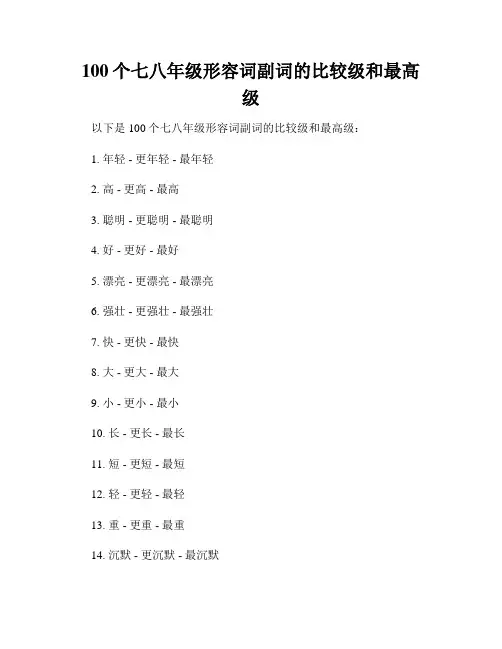
100个七八年级形容词副词的比较级和最高级以下是100个七八年级形容词副词的比较级和最高级:1. 年轻 - 更年轻 - 最年轻2. 高 - 更高 - 最高3. 聪明 - 更聪明 - 最聪明4. 好 - 更好 - 最好5. 漂亮 - 更漂亮 - 最漂亮6. 强壮 - 更强壮 - 最强壮7. 快 - 更快 - 最快8. 大 - 更大 - 最大9. 小 - 更小 - 最小10. 长 - 更长 - 最长11. 短 - 更短 - 最短12. 轻 - 更轻 - 最轻13. 重 - 更重 - 最重14. 沉默 - 更沉默 - 最沉默15. 明亮 - 更明亮 - 最明亮16. 老 - 更老 - 最老17. 干净 - 更干净 - 最干净18. 脏 - 更脏 - 最脏19. 安静 - 更安静 - 最安静20. 喧闹 - 更喧闹 - 最喧闹21. 繁忙 - 更繁忙 - 最繁忙22. 真实 - 更真实 - 最真实23. 可爱 - 更可爱 - 最可爱24. 难 - 更难 - 最难25. 容易 - 更容易 - 最容易26. 忙碌 - 更忙碌 - 最忙碌27. 宽 - 更宽 - 最宽28. 窄 - 更窄 - 最窄29. 美丽 - 更美丽 - 最美丽30. 简单 - 更简单 - 最简单31. 复杂 - 更复杂 - 最复杂32. 糟糕 - 更糟糕 - 最糟糕33. 热 - 更热 - 最热34. 冷 - 更冷 - 最冷35. 昂贵 - 更昂贵 - 最昂贵36. 便宜 - 更便宜 - 最便宜37. 深 - 更深 - 最深38. 浅 - 更浅 - 最浅39. 温暖 - 更温暖 - 最温暖40. 冰冷 - 更冰冷 - 最冰冷41. 丑陋 - 更丑陋 - 最丑陋42. 聒噪 - 更聒噪 - 最聒噪43. 爱 - 更爱 - 最爱44. 恨 - 更恨 - 最恨45. 难看 - 更难看 - 最难看46. 幸福 - 更幸福 - 最幸福47. 舒适 - 更舒适 - 最舒适48. 无聊 - 更无聊 - 最无聊49. 有趣 - 更有趣 - 最有趣50. 善良 - 更善良 - 最善良51. 内向 - 更内向 - 最内向52. 外向 - 更外向 - 最外向53. 勇敢 - 更勇敢 - 最勇敢54. 胆小 - 更胆小 - 最胆小55. 幽默 - 更幽默 - 最幽默56. 严肃 - 更严肃 - 最严肃57. 诚实 - 更诚实 - 最诚实58. 虚伪 - 更虚伪 - 最虚伪59. 忠诚 - 更忠诚 - 最忠诚60. 迟到 - 更迟到 - 最迟到61. 准时 - 更准时 - 最准时62. 强大 - 更强大 - 最强大63. 虚弱 - 更虚弱 - 最虚弱64. 困难 - 更困难 - 最困难65. 软 - 更软 - 最软66. 硬 - 更硬 - 最硬67. 紧张 - 更紧张 - 最紧张68. 放松 - 更放松 - 最放松69. 开心 - 更开心 - 最开心70. 悲伤 - 更悲伤 - 最悲伤71. 丰富 - 更丰富 - 最丰富72. 贫穷 - 更贫穷 - 最贫穷73. 羞涩 - 更羞涩 - 最羞涩74. 慷慨 - 更慷慨 - 最慷慨75. 吝啬 - 更吝啬 - 最吝啬76. 勤奋 - 更勤奋 - 最勤奋77. 懒惰 - 更懒惰 - 最懒惰78. 正直 - 更正直 - 最正直79. 懦弱 - 更懦弱 - 最懦弱80. 开放 - 更开放 - 最开放81. 闭塞 - 更闭塞 - 最闭塞82. 善解人意 - 更善解人意 - 最善解人意83. 自私 - 更自私 - 最自私84. 心胸狭窄 - 更心胸狭窄 - 最心胸狭窄85. 老实 - 更老实 - 最老实86. 不诚实 - 更不诚实 - 最不诚实87. 精明 - 更精明 - 最精明88. 天真 - 更天真 - 最天真89. 有礼貌 - 更有礼貌 - 最有礼貌90. 无礼貌 - 更无礼貌 - 最无礼貌91. 忍耐 - 更忍耐 - 最忍耐92. 不耐烦 - 更不耐烦 - 最不耐烦93. 胖 - 更胖 - 最胖94. 瘦 - 更瘦 - 最瘦95. 矮 - 更矮 - 最矮96. 瘦弱 - 更瘦弱 - 最瘦弱97. 开朗 - 更开朗 - 最开朗98. 内向 - 更内向 - 最内向99. 外向 - 更外向 - 最外向100. 喜欢 - 更喜欢 - 最喜欢。
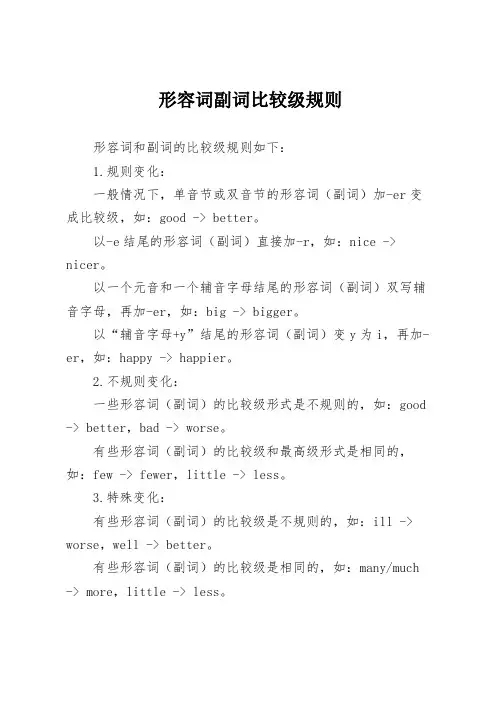
形容词副词比较级规则
形容词和副词的比较级规则如下:
1.规则变化:
一般情况下,单音节或双音节的形容词(副词)加-er变成比较级,如:good -> better。
以-e结尾的形容词(副词)直接加-r,如:nice -> nicer。
以一个元音和一个辅音字母结尾的形容词(副词)双写辅音字母,再加-er,如:big -> bigger。
以“辅音字母+y”结尾的形容词(副词)变y为i,再加-er,如:happy -> happier。
2.不规则变化:
一些形容词(副词)的比较级形式是不规则的,如:good -> better,bad -> worse。
有些形容词(副词)的比较级和最高级形式是相同的,如:few -> fewer,little -> less。
3.特殊变化:
有些形容词(副词)的比较级是不规则的,如:ill -> worse,well -> better。
有些形容词(副词)的比较级是相同的,如:many/much -> more,little -> less。
有些形容词(副词)没有比较级和最高级,如:perfect,eternal等。
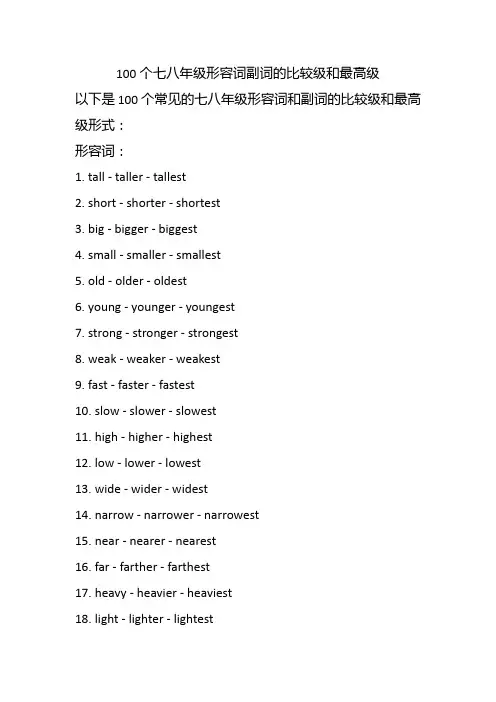
100个七八年级形容词副词的比较级和最高级以下是100个常见的七八年级形容词和副词的比较级和最高级形式:形容词:1. tall - taller - tallest2. short - shorter - shortest3. big - bigger - biggest4. small - smaller - smallest5. old - older - oldest6. young - younger - youngest7. strong - stronger - strongest8. weak - weaker - weakest9. fast - faster - fastest10. slow - slower - slowest11. high - higher - highest12. low - lower - lowest13. wide - wider - widest14. narrow - narrower - narrowest15. near - nearer - nearest16. far - farther - farthest17. heavy - heavier - heaviest18. light - lighter - lightest19. dangerous - more dangerous - most dangerous20. easy - easier - easiest21. busy - busier - busiest22. quiet - quieter - quietest23. beautiful - more beautiful - most beautiful24. delicious - more delicious - most delicious25. expensive - more expensive - most expensive26. cheap - cheaper - cheapest27. hot - hotter - hottest28. cold - colder - coldest29. clean - cleaner - cleanest30. dirty - dirtier - dirtiest31. good - better - best32. bad - worse - worst33. strong - stronger - strongest34. weak - weaker - weakest35. tall - taller - tallest36. short- shorter- shortest37. long- longer- longest38. narrow- narrower- narrowest39. early- earlier- earliest40. late- later- latest41. big- bigger- biggest42. beautiful- more beautiful- most beautiful43. safe- safer- safest44. near- nearer- nearest45. round- rounder- roundest46. thin- thinner- thinnest47. good- better- best48. fast- faster- fastest49. hot- hotter- hottest50. low- lower- lowest51. fat- fatter- fattest52. happy- happier- happiest53 late later latest54 simple simpler simplest55 near nearer nearest56 easy easier easiest57 quiet quiter quitest58 hard harder hardest59 big bigger biggest60 small smaller smallest61 hotter hottest hottest62 cold colder coldest63 thin thinner thinnest64 hard harder hardest65 tall taller tallest66 old older oldest67 new newer newest68 wide wider widest69 long longer longest70 short shorter shortest71 big bigger biggest72 small smaller smallest73 hot hotter hottest74 cold colder coldest75 good better best76 bad worse worst77 beautiful more beautiful most beautiful78 delicious more delicious most delicious79 expensive more expensive most expensive80 cheap cheaper cheapest81 fast faster fastest82 slow slower slowest83 high higher highest84 low lower lowest85 big bigger biggest86 small smaller smallest87 good better best88 bad worse worst89 beautiful more beautiful most beautiful90 delicious more delicious most delicious91 expensive more expensive most expensive92 cheap cheaper cheapest93 fast faster fastest94 slow slower slowest95 high higher highest96 low lower lowest97 big bigger biggest98 small smaller smallest99 good better best100 bad worse worst。
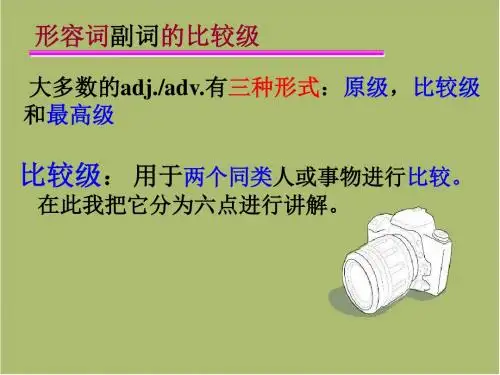
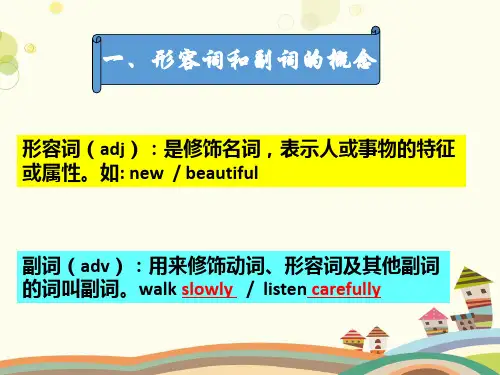
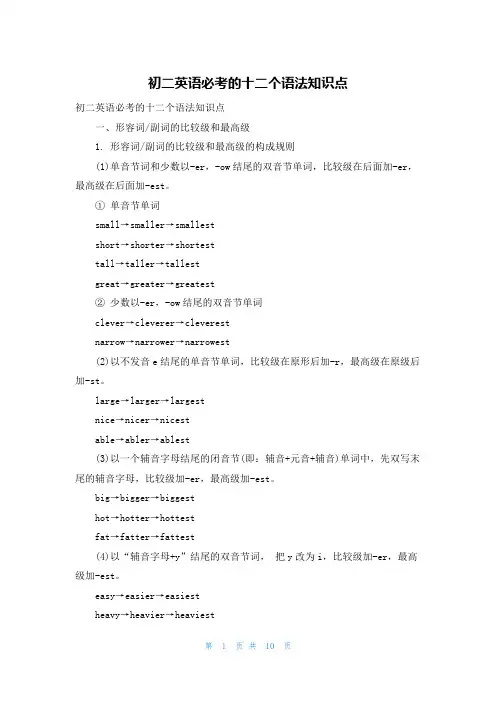
初二英语必考的十二个语法知识点初二英语必考的十二个语法知识点一、形容词/副词的比较级和最高级1. 形容词/副词的比较级和最高级的构成规则(1)单音节词和少数以-er,-ow结尾的双音节单词,比较级在后面加-er,最高级在后面加-est。
① 单音节单词small→smaller→smallestshort→shorter→shortesttall→taller→tallestgreat→greater→greatest② 少数以-er,-ow结尾的双音节单词clever→cleverer→cleverestnarrow→narrower→narrowest(2)以不发音e结尾的单音节单词,比较级在原形后加-r,最高级在原级后加-st。
large→larger→largestnice→nicer→nicestable→abler→ablest(3)以一个辅音字母结尾的闭音节(即:辅音+元音+辅音)单词中,先双写末尾的辅音字母,比较级加-er,最高级加-est。
big→bigger→biggesthot→hotter→hottestfat→fatter→fattest(4)以“辅音字母+y”结尾的双音节词,把y改为i,比较级加-er,最高级加-est。
easy→easier→easiestheavy→heavier→heaviestbusy→busier→busiesthappy→happier→happiest(5)其他双音节词和多音节词,比较级在前面加more,最高级在前面加most。
beautiful→more beautiful→most beautifuldifferent→more different→most differenteasily→more easily→most easily(6)有少数形容词、副词的比较级和最高级是不规则的,必须熟记。
good→better→bestwell→better→bestbad→worse→worstill→worse→worstold→older/elder→oldest/eldestmany/much→more→mostlittle→less→leastfar →further/farther→ furthest/farthest2. 形容词和副词比较级的用法(1)“甲+be+(倍数)+形容词比较级+than+乙”表示“甲比乙…”或“甲比乙…几倍”。

形容词和副词的原级、比较级和最高级知识点一、定义形容词和副词有三个等级,即原级、比较级和最高级。
比较级主要用于两者之间作比较,最高级主要用于三者或三者以上进行比较。
二、形容词和副词的比较级与最高级的变化规则三、重要句式原级句式(1)as+原级+as...像...一样not as/so+原级+as不如I am as tall as Yao Ming.我和要命一样高。
I am not so tall as Yao Ming.我不如姚明高。
(2)A+谓语动词+倍数+as+原级+as B,表示"A是B的……倍"Our school is twice as large as theirs.我们学校是他们学校的两倍大。
比较级句式(3)a little,a bit,a lot,much,even+比较级,表程度。
Yao Ming is much taller than you.姚明比你高多了。
You are even shorter than me.你甚至比我还矮。
The weather today is a lot warmer than it was yesterday.今天的天气比昨天暖和多了。
(4)比较级+and+比较级,表示"越来越……,”多音节词和部分双音节词用"more and more+原级"It’s becoming colder and colder.天气变得越来越冷了。
The problem is becoming more and more serious.问题变得越来越严重了。
(5)the+比较级,the+比较级,表示"越……就越……"The more you eat,the fatter you will be.吃得越多,就越胖。
(6)比较级常见句式:Which/Who+谓语动词+比较级,A or B?Who runs faster,Jim or Tom?谁跑得更快,吉姆还是汤姆?A+谓语动词+比较级+than B...A比B……My bike is bigger than hers.我的自行车比她的大。
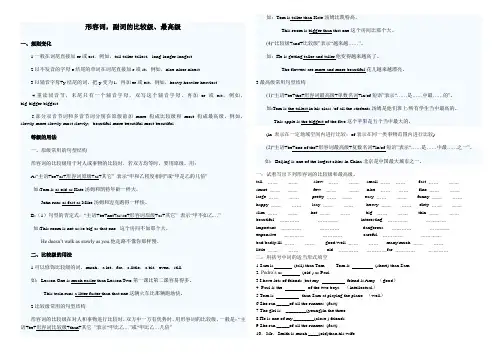
形容词,副词的比较级、最高级一、规则变化1.一般在词尾直接加er或est,例如,tall-taller-tallest,long-longer-longest2.以不发音的字母e结尾的单词在词尾直接加r或st,例如,nice-nicer-nicest3.以辅音字母+y结尾的词,把y变为i,再加er或est,例如,heavy-heavier-heaviest4.重读闭音节,末尾只有一个辅音字母,双写这个辅音字母,再加er或est,例如,big-bigger-biggest5.部分双音节词和多音节词分别在原级前加more构成比较级和most构成最高级,例如,slowly-more slowly-most slowly;beautiful-more beautiful-most beautiful等级的用法一、原级常用的句型结构形容词的比较级用于对人或事物的比较时,若双方均等时,要用原级,用:A:“主语+be+as+形容词原级+as+其它”表示“甲和乙程度相同”或“甲是乙的几倍”如:Tom is as old as Kate.汤姆和凯特年龄一样大。
John runs as fast as Mike.汤姆和迈克跑得一样快。
B:(1)句型的否定式:“主语+be+not+as/so+形容词原级+as+其它”表示“甲不如乙…”如:This room is not as/so big as that one. 这个房间不如那个大。
He doesn’t walk as slowly as you.他走路不像你那样慢。
二、比较级的用法1.可以修饰比较级的词,much,a lot,far,a little,a bit,even,still如:Lesson One is much easier than Lesson Two.第一课比第二课容易得多。
This train runs a litter faster than that one.这辆火车比那辆跑地快。

形容词、副词--比较级、最高级一、变化规律:1、规则变化:类别构成方法原级比较级最高级单音节和少数双音节词一般直接加-er,-est long longer Longest 以不发音的e结尾时,加-r,-stlate later latest以辅音y结尾,把y变i加-er,-esteasy easier easiest以重读闭音节结尾且末尾只有一个辅音字母时,双写最后一个字母加-er,-estbig bigger Biggest多音节和部分双音节在原级前加more、most Careful MorecarefulMostcareful2、不规则变化:原级比较级最高级good/well better best bad/badly/ill worse worst much/many more mostlittleless leastfar farther/furtherfarthest/furthestold older/elder oldest/eldest二、常见的副词用来修饰比较级:much, far, a lot (......得多)even, still (更......)a bit, a little(......少)绝对不可能有的副词修饰比较级的:quite, very, more三、多个形容词修饰一个名词时,其顺序为:限定词(冠词、指示代词等)+数词+描述性形容词+大小、长短、高低等形容词+形状+新旧+颜色+国籍+材料性质+用途类别。
概括为口诀是:美小圆旧黄,法国木书房。
或All冠代数前,描大形新颜国材。
Eg: an expensive Japanese sports car1、【2016•滨州】-"Food Safety" problem is becoming these days.-I think so.The government must do something to deal with it.A.smaller and smaller B.worse and worse C.better and better D.ni cer and nicer【解析】答案:B根据选项可知smaller and smaller意为越来越小;worse and worse意为越来越差;better and better意为越来越好;nicer and nicer意为越来越好.又根据 The government must do something to deal with it可知,希望政府采取措施应对这一问题,可推测上文意为"食品安全"问题越来越糟糕,是比较级 and 比较级的用法,表示越来越…所以此处应用worse and worse.故选B。

关于形容词和副词的.比较级一、含义1. 大多数形容词和副词有三个等级:原级、比较级、最高级: good – better - best2. 比较级:表示两者(人或物)之间的比较。
3. 加more/most ~的情况:①.部分双音节和多音节词;②.-ed/ing结尾的词;③ adj+ly→adv.4. 双写的词:一个大热天,一个胖子和一个瘦子穿着红衣服,汗湿了,很伤心。
big hot fat thin red wet sad二.比较级基本句型:↗连系动词+ adj.(比)如: Lucy is slower than Lily.1.主语+对比成分↘实义动词+ adv./ (比)如:Lucy runs more slowly than Lily.2. 主语必须与对比成分保持一致:3adj./adv.(原级)+as …: “如同…一样…”… not as/so+adj./adv.(原级)+as …: “不如…一样……” 4…… e.g. They talked more and more loudly.5. The比较级…,the+比较级…:越…就越…The more exercise you do, the stronger you’ll be.6. “Which / Who is + 比较级, A or B?”e.g. Which T-shirt is nicer, this one or that one?7. the+比较级+of the( two ): 两者中较…的一个Of the twins, she was the more hard-working .8. 常用the one代单数可数名词,the ones /those 代替复数名词,that 代替不可数名词.e.g. .9. 比较级前可用“数词+名词” 表示确定的度量。
e.g. I am (5 years) older than him.The room is (3 times) aslarge as that one. 注意:1. 原级常与very, as,so, too, quite,pretty, really等连用。
比较级&最高级一、分类:形容词和副词有原级、比较级和最高级三级.原级变为比较级和最高级有规则变化和不规则变化两种。
二、规则变化:形容词和副词的比较级和最高级的变化方法如下(1) 符合规则的:(2)几个不规则的形容词和副词的比较级和最高级如下表:三、形容词和副词的原级、比较级和最高级的用法:1e.g。
This room is bigger than that one. I am taller than you。
This lesson is more difficult than that one.注意:①修饰比较级的词有 a little, a bit ,a few , a lot ,much, even,still,far,rather,any 等表程度。
e。
g。
Today is _________ colder than yesterday(冷得多/一点)②为避免重复,在从句中常用the one 代替可数名词单数形式,调和ones 或those代替可数名词的复数形式,that代替不可数名词.E。
g。
The weather in Tianjin is colder than______of Guangzhou in winter.2、表示“…不如…”,用“less+原级+than”结构e。
g. The book is less difficult than that one. The film is less interesting than that one3、不与其他事物相比,表示本身程度的改变,用“比较级+and+比较级”结构,意思是“越来越…”e.g。
The weather is getting______ ______ 。
______ (越来越暖和)Our country is becoming _____ ______ . ______ (越来越漂亮)4、表示“两者之间比较。
八年级上形容词、副词的比较级和最高级的句型归纳一、形容词、副词的比较级用法1. 原级常用句型1)表示两者“相等”用“as+形容词原级+as+比较对象”This pen is as good as that one. 这支笔和那只笔一样好。
Your father is as kind as your mother. 你父亲和你母亲一样善良。
用“实意动词+as+副词原级+as+比较对象”Tom runs as fast as Mike. 汤姆和迈克跑得一样快。
2)表示“不如”或“不相等”用“not+as/so+形容词原级+as+比较对象”My pronunciation is not as/so good as yours. 我的发音不如你的。
用“助动词+not+as/so+副词原级+as+比较对象”He doesn't walk as slowly as you.他走路不像你那样慢。
3)表示“倍数”,如“一半/两倍/三倍/...”等用“half/twice/three times等倍数+as+形容词原级+as...”结构This room is four times as large as that one. 这个房间比那个房间大三倍。
Tom is twice as old as Kate. 汤姆的年龄是凯特的二倍。
用“实意动词+half/twice/three times等倍数+as+副词原级+as...”结构I study twice as hard as you. 我学习比你努力一倍。
Tom runs twice as fast as Mike. 汤姆跑得速度是迈克的二倍。
2. 形容词、副词比较级常用句型1)“甲+be+(倍数)+形容词比较级+than+乙”,表示“甲比乙…”或“甲比乙…几倍”Tom is taller than Kate. 汤姆比凯特高。
This room is three times bigger than that one. 这个房间比那个大三倍。
形容词和副词的比较等级一、形容词和副词有三个等级:1.原级.2。
比较级,表示“较……"或“更……一些”的意思。
3。
最高级,表示“最……”的意思.二、形容词、副词比较等级的构成:(一)、规则变化:①一般直接在形容词或副词后加-er或—est,如:small -——smaller --- smallest long-—-longer---longest②以不发音—e结尾的形容词或副词直接加–r或–st,如:large --- largest --—largest nice--—nicer—--nicest③以重读闭音节结尾,且末尾只有一个辅音字母的,双写该辅音字母,再加-er或—est。
big -——bigger--—biggest hot--- hotter---hottest④以辅音字母加y 结尾的形容词和副词,把“y”变“i”,再加–er或-est.busy-——busier-—-busiest happy——-happier———happiest⑤部分双音节及多音节形容词或副词前要加more和most构成比较级和最高级,如:slowly —-—more slowly —-—most slowlydifficult———more difficult——-most difficultbeautiful———more beautiful—--most beautiful(二)、不规则的变化:good / well———better-——bestmany/much--—more-—-mostbad / ill / badly ———worse-—-worstlittle---less---leastfar -—- farther / further ———farthest/ furthestold—-—older/ elder-——oldest/ eldest三、形容词、副词原级的用法1.修饰形容词副词原级的常见的词有:very,so, too, enough,quite 等。
初中形容词和副词的比较级最高级形容词和副词的比较级和最高级变化方法如下:1) 符合规则的:一般情况:直接加-er和-est。
以e结尾的词:直接加-r和-st。
以“辅音+y”结尾的词:变y为i再加-er和-est。
以一个辅音字母结尾的词:辅音字母双写,再加-er和-est。
例词:all-taller-tallest。
nice-nicer-nicest。
dry-drier-driest。
heavy-heavier-heaviest。
XXX-XXX-thinnest。
多音节和部分双音节单词在词前加more和most,如more us。
2) 几个不规则的形容词和副词的比较级和最高级如下表:原级:good。
well。
bad。
ill。
many。
much。
little。
far比较级:better。
worse。
more。
less。
XXX最高级:XXX。
worst。
most。
least。
XXX形容词和副词比较级的用法:级别表达方式和意义例句原级 As+原级+as(像……一样) XXX。
不如……那样) She does not study so well as I do。
比较级比较级+than(比……) XXX XXX。
比较级前面可以加much。
far。
even。
still。
a lot。
a little。
a bit等。
I like pork better than beef。
程度加深比较级+and+比较级(越来越……) XXX。
The +比较级,the +比较级(越……,越……) XXX.The more books she reads。
the better her XXX the best season of the year。
Lin Tao jumped the farthest of all。
Note that the article "the" is often omitted before the XXX。
八年级上册英语形容词和副词的比较级和最高级绝大多数形容词有三种形式,原级,比较级和最高级, 以表示形容词说明的性质在程度上的不同。
一、形容词的原级: 形容词的原级形式就是词典中出现的形容词的原形。
例如: poor tall great glad bad二、比较级的定义:大多数的形容词都有三个级别:原级、比较级、最高级。
其中比较级表示“更……”,用于两者之间的比较,用来说明“前者比后者更……”,比较级前面一般用much, even, a little,a lot 修饰,其中even, much 只能修饰比较级。
三、比较级和最高级的构成:(1)规则变化:①单音节和部分双音节的形容词比较级一般在词尾加-er,最高级在词尾加-este.g: calm--calmer—calmest tall--taller--tallest smart--smarter--smartest②以字母e结尾的比较级直接在词尾加-r,最高级加-st.e.g: nice--nicer -nicest fine--finer-finest large—larger--largest③以“辅音+y 结尾的词,变y为 i,比较级加-er”,最高级加-est.e.g: early—earlier-earliest happy—happier-happiest busy—busier-busiest④以重读闭音节的单个辅音字母结尾的词,双写辅音字母,比较级加-er,最高级加-este.g: big—bigger-biggest thin—thinner-thinnest hot—hotter-hottest⑤多音节或部分双音节的形容词,比较级在原级前面加more,最高级在原级前加moste.g: popular--more popular—most popular important--more important—most important(2)不规则变化:少数形容词的比较级变化是不规则的:good—better--best bad/ill—worse--worst many/much—more--mostlittle—less--least far--farther/further—farthest/furthestold---older/elder—oldest/eldest四、比较级的用法:(一)当两个人或事物(A和B)进行比较时,我们需要用到形容词(副词)的原级或者比较级1.表达“A和B一样”,用as…as的结构。
形容词和副词的比较级、最高级讲解形容词比较级和最高级的形式一、形容词比较级和最高级的构成构成法原级比较级最高级①一般单音节词末尾加-er 和-est strong stronger strongest②单音节词如果以-e结尾,只加-r 和-st strange stranger strangest③闭音节单音节词如末尾只有一个辅音字母,须先双写这个辅音字母,再加-er和-est sadbighotsadderbiggerhottersaddestbiggesthottest④少数以-y, -er(或-ure), -ow, -ble结尾的双音节词,末尾加-er和-est(以-y结尾的词,如y前是辅音字母,把y变成i,再加-er和-est,以-e结尾的词仍加-r和-st)angryclevernarrownobleangriercleverernarrowernoblerangriestcleverestnarrowestnoblest⑤其他双音节和多音节词都在前面加单词more和most difficultmoredifficult most difficult二、不规则形容词的比较级和最高级形式原级比较级最高级good / well better bestbad / ill worse worstmany / much more mostlittle few less leastfar farther / further farthest / furthest三、副词比较级和最高级的形式(一)一般副词hard→ ha rder →hardest fast→faster →fastestlate→later →latest early→earlier →earliest(二)特殊副词well →better →best much →more →mostbadly →worse →worst little →less →least(三)开放类副词开放类副词即以后缀-ly结尾的副词不能像形容词那样加-er或-est,而应在副词原形前加more或most。
如:quickly →more quickly →most quickly quietly →more quietly →most quietly四、形容词与副词比较级和最高级的基本用法(一)比较级1.比较级通常由“形容词(副词)比较级+than+…” 构成,表示在两者中间一方比另一方“更加……”。
连词than后可接句子,也可接名词、代词、名词短语、介词短语、动词、动词不定式、-ing结构和-ed结构,有时也可省去than。
如:eg: Mary is happier than Jane. (形容词和系词连用)玛丽比珍妮幸福。
eg: He lives more happily than I. (副词修饰行为动词)他过得比我幸福。
2.注意than前后两项相比较的人或事物要一致。
如:eg: The purpose of the research had a more important meaning for them than it did for us.eg: Sound travels faster through water than through air.3.比较级前还可用much, even, still, a little等词语来修饰,表示“……得多”,“甚至……”,“更……”,“……一些”等意思。
如:eg: Japan is a little larger than Germany.日本比德国大一点儿。
用“…times + 形容词的比较级+ than…”句式表示倍数;用“表示数量的词+ 比较级”来表示具体的比较差别。
如:eg: Our room is twice larger than theirs.我们的房间比他们的大两倍。
eg: He is a head taller than I.他比我高一头。
4.隐含比较级1)有时比较级并不一定出现than,这时通过上下文可暗示出。
如:eg: Are you feeling better now?你现在感觉好些了吗?2)有些形容词在表示比较的时候,跟“to”而不用“than”。
如:prior to 较早的,较重要的superior to优越,高于inferior to 下等的,次的senior to 年长的,地位高的junior to年幼的,地位低的,迟的preferable to 更好的eg: The task is prior to all others.这项任务比其他所有的任务都重要。
eg: In maths he felt superior to John.他觉得自己数学比约翰强。
eg: He is two years senior to me.他比我大两岁。
eg: Health without riches is preferable to riches without health.贫穷但健康要比富有却多病更可取。
(二)最高级1.最高级用于三者以上比较,形容词的结构形式是“定冠词+形容词最高级+名词+表示范围的短语或从句” (如of all, of the three, in the world, that has ever taken place等)。
如:eg: Of all of the writers in England, William Shakespeare is the most widely known.2.副词的最高级与形容词最高级的区别在于最高级前没有定冠词the。
如:eg: He runs fastest of the three.三个人中他跑得最快。
3.当用介词短语表明形容词最高级的比较范围,作介词宾语的名词或代词与句中的主语属同一类人或物,并把主语包括在内时,用介词of;如不属于同一类人或物,而只说明在某一时间、空间范围内的比较时,用介词in。
如:eg: He is the tallest of the four boys. ( He 与boy属同类)eg: He is the tallest in our class. ( He与class不属同类)4.可以用原级,比较级,最高级三种形式来表示最高级的意思。
如:eg: She is the best student in her class.eg: She is better than any other student in her class.eg: No other student in her class is better than she.eg: No other student in her class is as good as she.五、课后练习题(一)用适当形式填空1. Bob is _________ (young) than Fred but ___________ (tall) than Fred.2. Ying Tian is not as ___________ (tall) as Yong Xian.3. Almost all the students' faces are the same but Li Deming looks _______ (fat) thanbefore the holidays,4.Which is _________ (heavy),a hen or a chicken?5.-- How _________ (tall) is Sally?-- She' s 1.55 metres ________ (tall). What about Xiaoling?-- She' s only 1.40 metres ________ (tall). She is much _______ (short) than Sally.She is also the _______ (short) girl in the class.6. He is ______ (bad) at learning maths. He is much _______ (bad) at Chinese and he is the_________ (bad) at English.7. Annie says Sally is the ________ (kind) person in the world.8. He is one of the_________(friendly) people in the class, I think.9. A dictionary is much _________ (expensive) than a story-book.10. An orange is a little ______ (big) than an apple, but much ________ (small) than a watermelon.11. The Changjiang River is the _______ (long) river in China.12. Sue is a little ________ (beautiful) than her sister.13. My room is not as _________ (big) as my brother' s.14.--How difficult is physics?--I' m not sure.-- Is it ________ (difficult) than maths?-- I don’t think so.15. --Annie plays the piano very ___________ (well).-- Sue plays it _____ (well) than Annie. And Sally plays it the __________ (well).16. Saturday is my _________ (busy) day in a week.17. Her mother is getting ____________(fat) and ________ (fat).18. I think it’s too expensive. I’d like a _____________ (cheap) one.19. He comes to school much ____________ (early) than I.20.This book is not as _____________ (interesting) as that one.21. Your classroom is __________(wide) and _________(bright) than ours.22. Practise as __________ (much) as you can.23. The ________ (much), the ____________ (good).24. Nowadays English is _________( important ) than any other subject, 1 think.25. Most of the students think a lion is much ________(dangerous) than a bear and it is the __________ (dangerous) animal in the world.(二)单项选择题1. This box is________ that one.A. heavy thanB. so heavy thanC. heavier asD. as heavy as2. When we speak to people, we should be __________.A. as polite as possibleB. as polite as possiblyC. as politely as possibleD. as politely as possibly3. This book is______ that one, but______ than that one.A. as difficult as; expensiveB. as more difficult as; more expensiveC. as difficult as; more expensiveD. more difficult as; as expensive4. I think the story is not so ______ as that one.A. interestingB. interestedC. more interestingD. most interesting5. His father began to work______ he was seven years old.A. as old asB. as early asC. sinceD. while6. I think science is _______ than Japanese.A. much importantB. importantC. much more importantD. more much important7. This pencil is______ than that one.A. longestB. longC. longerD. as long8. My mother is no _______ young.A. shorterB. longerC. littleD. few9. These children are ________ this year than they were last year.A. more tallB. more tallerC. very tallerD. much taller10. It was very hot yesterday, but it is_______ today.A. even hotterB. more hotterC. much more hotD. much hot11. Mrs. Black has got_______ instead of getting any better.A. more badB. a little worseC. much badlyD. a lot of worse12. When we arrived, we found the meeting room crowded with_______ students.A. quite a fewB. only a fewC. fewD. a few quite13. The house is _______ small for a family of six.A. much tooB. too muchC. very muchD. so14. Through the window we can see nothing but _______ buildings.A. tall very manyB. very many tallC. very tall manyD. many very tall15. -What's your brother like?-He is_______.A. a driverB. very tallC. my friendD. at school16. The jacket was so_______ that he decided to buy it.A. muchB. littleC. expensiveD. cheap17. Our classroom is________ larger than theirs.A. moreB. quiteC. veryD. much18. The earth is about________ as the moon.A. as fifty time bigB. fifty times as bigC. as big fifty timesD. fifty as times big19. Your room is ________ mine.A. twice as large thanB. twice the size ofC. bigger twice thanD. as twice large as20. Your room is ________ than mine.A. three time bigB. three times bigC. three times biggerD. bigger three times (三)完成句子1 她看起来不如玛丽年轻。